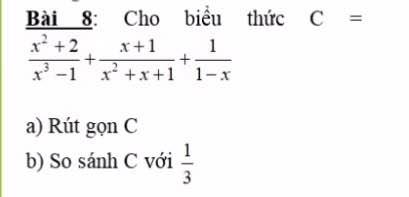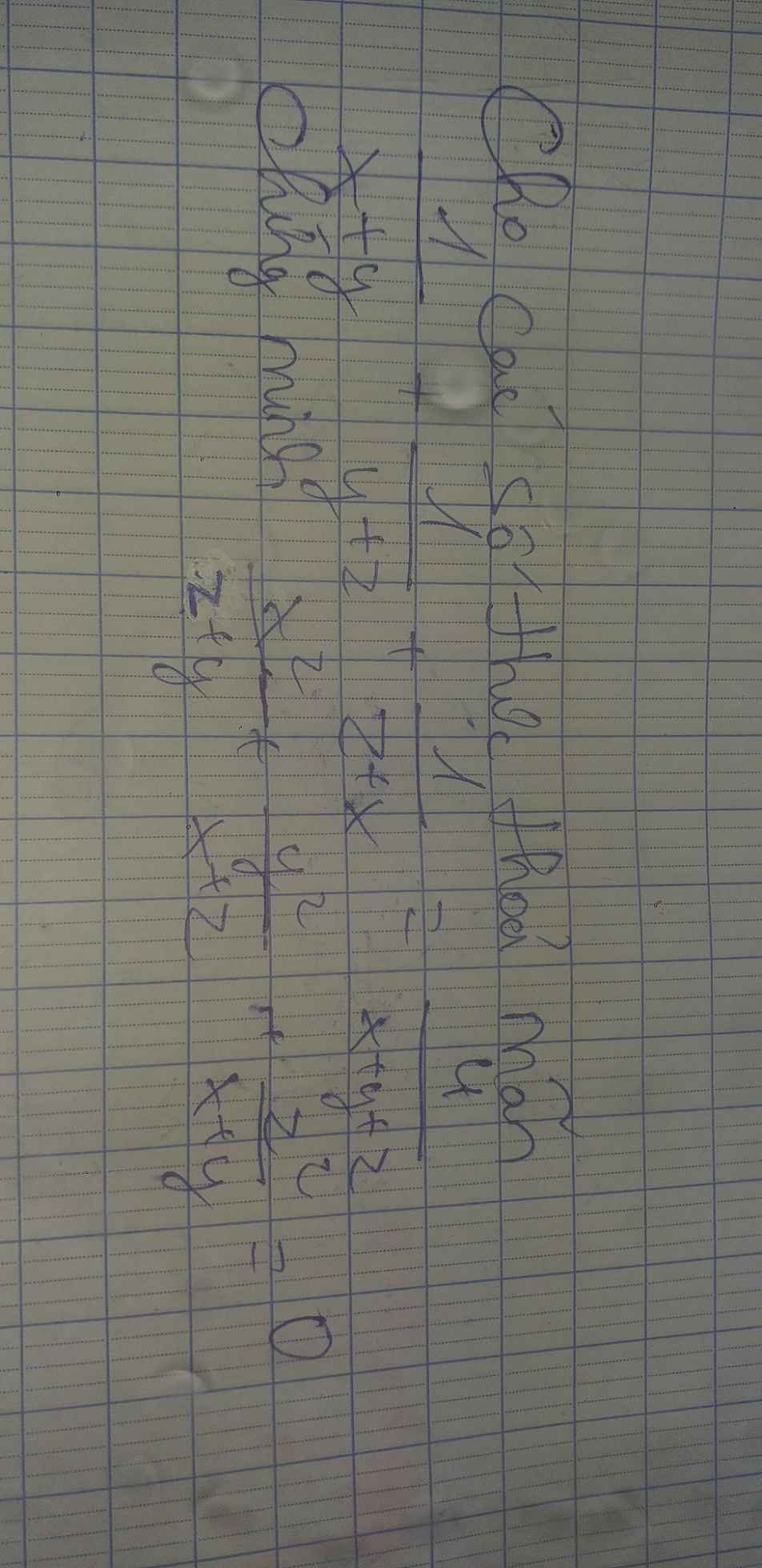
Hãy nhập câu hỏi của bạn vào đây, nếu là tài khoản VIP, bạn sẽ được ưu tiên trả lời.



\(\left|2x-3\right|=3-2x\)
\(ĐK:x\le\dfrac{3}{2}\)
\(\Leftrightarrow\left[{}\begin{matrix}2x-3=3-2x\\3-2x=3-2x\end{matrix}\right.\)
\(\Leftrightarrow\left[{}\begin{matrix}x=\dfrac{3}{2}\\0=0\left(đúng\right)\end{matrix}\right.\)
Vậy \(S=\left\{x\in R;x=\dfrac{3}{2}\right\}\)

1: =>x^2-5x+6-x^2-5x-6=x^2+1-x^2+9
=>-10x=10
=>x=-1(nhận)
2: \(\Leftrightarrow3x^2-15x-x^2+2x-2x^2=0\)
=>-13x=0
=>x=0
3: \(\Leftrightarrow13\left(x+3\right)+x^2-9=12x+42\)
=>x^2-9+13x+39-12x-42=0
=>x^2+x-12=0
=>(x+4)(x-3)=0
=>x=3(loại) hoặc x=-4(nhận)
4: \(\Leftrightarrow-2+x^2-5x+4=x^2+x-6\)
=>-5x-2=x-6
=>-6x=-4
=>x=2/3


a) \(2x\left(x+1\right)+2\left(x+1\right)=\left(x+1\right)\left(2x+2\right)=2\left(x+1\right)^2\)
b) \(y^2\left(x^2+y\right)-zx^2-zy=y^2\left(x^2+y\right)-z\left(x^2+y\right)=\left(x^2+y\right)\left(y^2-z\right)\)
c) \(4x\left(x-2y\right)+8y\left(2y-x\right)=4\left(x-2y\right)\left(x-2y\right)=4\left(x-2y\right)^2\)
d) \(3x\left(x+1\right)^2-5x^2\left(x+1\right)+7\left(x+1\right)=\left(x+1\right)\left(3x^2+3x-5x^2+7\right)=\left(x+1\right)\left(-2x^2+3x+7\right)\)

a) x(4x + 2) = 4x2 - 14
⇔ 4x2 + 2x = 4x2 - 14
⇔ 4x2 - 4x2 + 2x = -14
⇔ 2x = -14
⇔ x = -7
Vậy tập nghiệm S = ......
b) (x2 - 9)(2x - 1) = 0
⇔ x2 - 9 = 0 hoặc 2x - 1 = 0
⇔ x2 = 9 hoặc 2x = 1
⇔ x = 3 hoặc -3 hoặc x = \(\dfrac{1}{2}\)
Vậy .......
c) \(\dfrac{3}{x-2}\) + \(\dfrac{4}{x+2}\) = \(\dfrac{x-12}{x^2-4}\)
⇔ \(\dfrac{3}{x-2}\) + \(\dfrac{4}{x+2}\) = \(\dfrac{x-12}{\left(x-2\right)\left(x+2\right)}\)
ĐKXĐ: x - 2 ≠ 0 và x + 2 ≠ 0
⇔ x ≠ 2 và x ≠ -2MSC (mẫu số chung): (x - 2)(x + 2)Quy đồng mẫu hai vế và khử mẫu ta được:3x + 6 + 4x - 8 = x - 12⇔ 3x + 4x - x = 8 - 6 - 12⇔ 6x = -10⇔ x = \(-\dfrac{5}{3}\) (nhận)Vậy ........
1: \(\dfrac{4x^3-2x^2-3x+1}{x-2}\)
\(=\dfrac{4x^3-8x^2+6x^2-12x+9x-18+19}{x-2}\)
\(=4x^2+6x+9+\dfrac{19}{x-2}\)
2: \(\dfrac{2x^4-x^3-3x^2-2x}{x-2}\)
\(=\dfrac{2x^4-4x^3+5x^3-10x^2+7x^2-14x+12x-24+24}{x-2}\)
\(=2x^3+5x^2+7x+12+\dfrac{24}{x-2}\)


 ai giúp mik bài này đc ko ạ, mik cảm ơn!
ai giúp mik bài này đc ko ạ, mik cảm ơn!


a) \(\dfrac{x^2+2}{x^3-1}+\dfrac{x+1}{x^2+x+1}+\dfrac{1}{1-x}\)
\(=\dfrac{x^2+2}{\left(x-1\right)\left(x^2+x+1\right)}+\dfrac{x+1}{x^2+x+1}+\dfrac{1}{1-x}\)
\(=\dfrac{x^2+2}{\left(x-1\right)\left(x^2+x+1\right)}+\dfrac{\left(x-1\right)\left(x+1\right)}{\left(x-1\right)\left(x^2+x+1\right)}-\dfrac{x^2+x+1}{\left(x-1\right)\left(x^2+x+1\right)}\)
\(=\dfrac{\left(x^2+2\right)+\left(x-1\right)\left(x+1\right)-\left(x^2+x+1\right)}{\left(x-1\right)\left(x^2+x+1\right)}\)
\(=\dfrac{x^2+2+x^2-1-x^2-x-1}{\left(x-1\right)\left(x^2+x+1\right)}\)
\(=\dfrac{x^2-x}{\left(x-1\right)\left(x^2+x+1\right)}\)
\(=\dfrac{x\left(x-1\right)}{\left(x-1\right)\left(x^2+x+1\right)}\)
\(=\dfrac{x}{x^2+x+1}\)